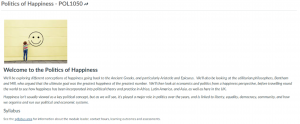With David Walker
School of Geography, Politics and Sociology
Faculty of Humanities and Social Sciences
What did you do?
Introduced and integrated student wellbeing assignments into the course, Politics of Happiness. Weekly assignments are posted on canvas that could be on mindfulness and meditation, exercise, or unplugging your devices for students to complete.
There is an emphasis on the scientific evidence so that assignments don’t come across as too flaky or not worth completing. The students will then complete these assignments week by week but the assignment don’t have to be handed in at that point. After the Christmas break, there is a reflective log that students will submit and that is part of the overall assessment. Around half of the reflective log is devoted to reflections on wellbeing and the wellbeing assignments.
Course – Politics of Happiness – POL1050
Students – 165 in total
Linking the politics of happiness is about looking at politics at the societal level, and the wellbeing assignments are at the individual level. Connecting the material and the student.
List of assignments
| Wellbeing Theme | Assignment |
|---|---|
| Purpose | Begin project of identifying your purpose using Croft, Smith or TED talk guidelines. |
| Goal-setting | Set goals for term, year and beyond using Houston or Pettit guidelines. |
| Activity/Exercise | Exercise or be active every day using Mental Health Foundation advice if required. |
| Gratitude | Start and keep a gratitude journal using Marsh guidelines. |
| Mindfulness/Meditation | Practice meditation daily using Headspace or other app/online guidance. |
| Unplug | ‘Unplug’ completely from all technology devices (smart phones, laptops, tablets, TV, Fitbits, music devices, etc.) for a minimum of three hours. |
| Giving | Commit five conscious acts of kindness, e.g. give time or money to a good cause, help someone, or do a random act of kindness. |
| Connecting and Friendship | Focus on friends, e.g. getting in touch with a friend you haven’t seen in a while; expressing appreciation to a friend; doing something nice for a friend; make a new friendship. |
| Happy Reminiscences | Carry out reminiscence exercise focusing on happy memories and a time when you successfully dealt with a challenge. |
Who is involved?
Dr David Walker, Senior Lecturer Geography, Politics & Sociology
Libby Morrison, PGR PhD Human Geography
How did you do it?
Trying to integrate into the teaching is the first challenge. Using the agenda is very good in terms of student wellbeing, because it helps people to engage, become integrated, feel recognised and that is good for their wellbeing.
The process was to review wellbeing resources like literature, websites, TED talks to identify key themes. There are nine weeks and nine different themes to identify and each week these resources provided the content. Activities such as meditation, turning off your devices, exercise also formatted part of the content.
For assessments, the research is clear that exams stress students out more than coursework assessments. There was a move to coursework rather than essay as a form of assessment.
Why did you do it?
It is a good fit with the content of the module and there is a good connection between the theory and the material students will engage with each week.
A general increasing awareness of the students mental health and mental health concerns was a major factor in this learning. In particular in 2020 with students, not having that engagement, either with teachers or with other students having more opportunities for social interaction has been very important.
They’re more likely to feel isolated and if they’re more isolated or less engaged, they’re more likely to suffer from mental health issues.
This is a way of counter balancing the adverse impact on the mental wellbeing with some activities and scientifically shown help to boost it.
Does it work at Student Voice
It was never intended to do this in 2020 but due to covid and the lockdown this became a pilot, to the extent that it is being tried out and amended accordingly.
In seminars students have been engaged more about the assignment and encouraged to use the chat function. There seems to be a reasonable degree of engagement.
In the exercise week one a student discussed walking the dog as their exercise, which started students discussing their dogs. That was a spinoff and by-product that the students start to engage with each other. In some ways it’s easier to talk about this example rather than something that’s more rigorously academic
Comments from students include:
“the well-being assignments are very helpful”
“well-being assignments are a lot of work but I do quite like them and they were totally unexpected as a part of my uni work”
“I’m enjoying the weekly Wellbeing tasks”
“I’ve previously been skeptical of how well tasks like ‘wellbeing assignments’ work, having done some similar in the past that weren’t so effective or successful. However, I am pleasantly surprised with how interesting and effective the ones assigned are. I enjoy doing them which I would not have expected.”
Graduate Framework
This approach develops the following attributes:
- Resilient
- Confident
- Curious
- Engaged
Staff can find out more about the Graduate Framework on the University intranet.

